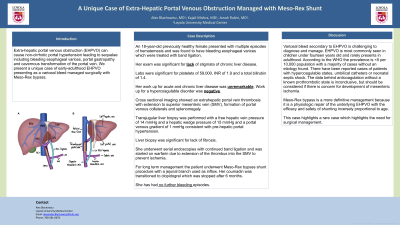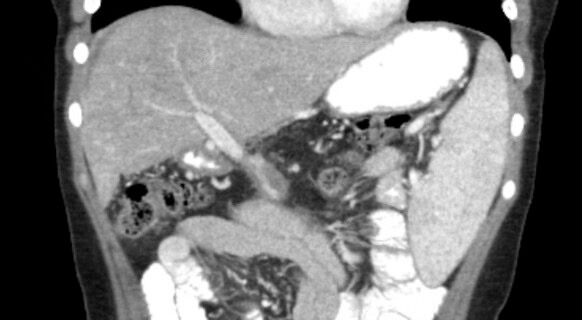Back


Poster Session D - Tuesday Morning
Category: Liver
D0578 - A Unique Case of Extra Hepatic Portal Venous Obstruction Managed by Meso-Rex Shunt
Tuesday, October 25, 2022
10:00 AM – 12:00 PM ET
Location: Crown Ballroom

Has Audio

Alex Blachowicz, MD
Loyola University Medical Center
Maywood, IL
Presenting Author(s)
Alex Blachowicz, MD, Kajali Mishra, MD, Jonah Rubin, MD
Loyola University Medical Center, Maywood, IL
Introduction: Extra-hepatic portal venous obstruction (EHPVO) can cause non-cirrhotic portal hypertension leading to sequelae including bleeding esophageal varices, portal gastropathy and cavernous transformation of the portal vein. We present a unique case of early-adulthood EHPVO presenting as a variceal bleed managed surgically with Meso-Rex bypass.
Case Description/Methods: An 18-year-old previously healthy female presented with multiple episodes of hematemesis and was found to have bleeding esophageal varices which were treated with band ligation. Her exam was significant for lack of stigmata of chronic liver disease. Labs were significant for platelets of 59,000, INR of 1.9 and a total bilirubin of 1.4. Her work up for acute and chronic liver disease was unremarkable. Cross sectional imaging showed an extrahepatic portal vein thrombosis with extension to superior mesenteric vein (SMV), formation of portal venous collaterals and splenomegaly. Work up for a hypercoagulable disorder was negative. Transjugular liver biopsy was performed with a free hepatic vein pressure of 14 mmHg and a hepatic wedge pressure of 15 mmHg and a portal venous gradient of 1 mmHg consistent with pre-hepatic portal hypertension. Liver pathology was significant for lack of fibrosis. She underwent serial endoscopies with continued band ligation and was started on warfarin due to extension of the thrombus into the SMV to prevent ischemia. For long term management the patient underwent Meso-Rex bypass shunt procedure with a jejunal branch used as inflow. Her coumadin was transitioned to clopidogrel which was stopped after 6 months. She has had no further bleeding episodes.
Discussion: Variceal bleed secondary to EHPVO is challenging to diagnose and manage. EHPVO is most commonly seen in children under fourteen years old and rarely presents in adulthood. According to the WHO the prevalence is < 5 per 10,000 population with a majority of cases without an etiology found. There have been reported cases of patients with hypercoagulable states, umbilical catheters or neonatal septic shock. The data behind anticoagulation without a known prothrombotic state is inconclusive, but should be considered if there is concern for development of mesenteric ischemia. Meso-Rex bypass is more definitive management because it is a physiologic repair of the underlying EHPVO with the efficacy and safety of shunting inversely proportional to age. This case highlights a rare case which highlights the need for surgical management.

Disclosures:
Alex Blachowicz, MD, Kajali Mishra, MD, Jonah Rubin, MD. D0578 - A Unique Case of Extra Hepatic Portal Venous Obstruction Managed by Meso-Rex Shunt, ACG 2022 Annual Scientific Meeting Abstracts. Charlotte, NC: American College of Gastroenterology.
Loyola University Medical Center, Maywood, IL
Introduction: Extra-hepatic portal venous obstruction (EHPVO) can cause non-cirrhotic portal hypertension leading to sequelae including bleeding esophageal varices, portal gastropathy and cavernous transformation of the portal vein. We present a unique case of early-adulthood EHPVO presenting as a variceal bleed managed surgically with Meso-Rex bypass.
Case Description/Methods: An 18-year-old previously healthy female presented with multiple episodes of hematemesis and was found to have bleeding esophageal varices which were treated with band ligation. Her exam was significant for lack of stigmata of chronic liver disease. Labs were significant for platelets of 59,000, INR of 1.9 and a total bilirubin of 1.4. Her work up for acute and chronic liver disease was unremarkable. Cross sectional imaging showed an extrahepatic portal vein thrombosis with extension to superior mesenteric vein (SMV), formation of portal venous collaterals and splenomegaly. Work up for a hypercoagulable disorder was negative. Transjugular liver biopsy was performed with a free hepatic vein pressure of 14 mmHg and a hepatic wedge pressure of 15 mmHg and a portal venous gradient of 1 mmHg consistent with pre-hepatic portal hypertension. Liver pathology was significant for lack of fibrosis. She underwent serial endoscopies with continued band ligation and was started on warfarin due to extension of the thrombus into the SMV to prevent ischemia. For long term management the patient underwent Meso-Rex bypass shunt procedure with a jejunal branch used as inflow. Her coumadin was transitioned to clopidogrel which was stopped after 6 months. She has had no further bleeding episodes.
Discussion: Variceal bleed secondary to EHPVO is challenging to diagnose and manage. EHPVO is most commonly seen in children under fourteen years old and rarely presents in adulthood. According to the WHO the prevalence is < 5 per 10,000 population with a majority of cases without an etiology found. There have been reported cases of patients with hypercoagulable states, umbilical catheters or neonatal septic shock. The data behind anticoagulation without a known prothrombotic state is inconclusive, but should be considered if there is concern for development of mesenteric ischemia. Meso-Rex bypass is more definitive management because it is a physiologic repair of the underlying EHPVO with the efficacy and safety of shunting inversely proportional to age. This case highlights a rare case which highlights the need for surgical management.

Figure: Coronal Cross-Section of Meso-Rex Shunt
Disclosures:
Alex Blachowicz indicated no relevant financial relationships.
Kajali Mishra indicated no relevant financial relationships.
Jonah Rubin indicated no relevant financial relationships.
Alex Blachowicz, MD, Kajali Mishra, MD, Jonah Rubin, MD. D0578 - A Unique Case of Extra Hepatic Portal Venous Obstruction Managed by Meso-Rex Shunt, ACG 2022 Annual Scientific Meeting Abstracts. Charlotte, NC: American College of Gastroenterology.
